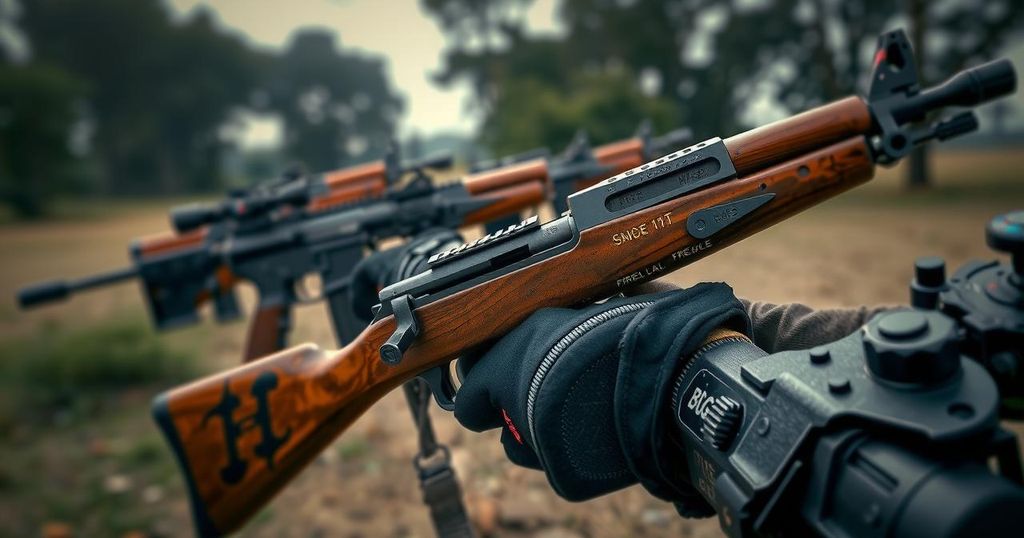UAE’s Armoured Vehicles with French Technology Found in Sudan Amid Civil War

Amnesty International reported that the Sudanese RSF is using UAE-manufactured armoured vehicles with French military technology, raising concerns of violations against the UN arms embargo on Sudan. The vehicles, made by the UAE’s Edge Group and equipped with French Galix systems, have been linked to significant human rights abuses in the ongoing civil conflict. The findings stress the need for enforcing arms embargoes amid escalating violence and humanitarian crises in Sudan.
Amnesty International disclosed on Thursday that the Sudanese Rapid Support Forces (RSF) are utilizing armoured carriers designed by the United Arab Emirates (UAE), which include advanced French military technology, in the ongoing civil conflict. This revelation raises concerns regarding potential violations of the United Nations arms embargo on Darfur. The organization has urged all nations to refrain from supplying weapons to entities involved in the Sudanese conflict. A report published on November 14, 2024, details that these armoured vehicles, manufactured by the UAE’s Edge Group, are outfitted with the French-developed Galix reactive defence system, aimed at countering incoming threats. The Sudanese Armed Forces have purportedly captured and destroyed some of these vehicles, specifically identified as Nimr Ajban armoured personnel carriers (APCs), which the RSF have deployed in confrontations against the Sudanese Armed Forces (SAF). Amnesty International stated that the presence of these military vehicles in conflict zones, particularly in Darfur, likely constitutes a breach of the United Nations arms embargo, which prohibits the transfer of weapons to Sudan due to its volatile history with armed militias, including the RSF. Agnès Callamard, Secretary-General of Amnesty International, called upon the French government to halt any future supplies of these defense systems to the UAE, emphasizing that their deployment in Sudan contravenes international arms regulations. In response to these allegations, the UAE government has denied any involvement in supplying weapons or support to the RSF. Amnesty International’s findings highlight the critical necessity for stringent enforcement of arms embargoes to mitigate the escalation of violence within Sudan, a country ravaged by a civil war that has claimed over 20,000 lives and displaced nearly 12 million persons since its onset in April 2023. The conflict, fueled by advanced military weaponry, has given rise to severe human rights violations, including widespread reports of ethnic cleansing, sexual violence, and mass displacements. Officials from the United Nations, such as Under-Secretary-General Rosemary DiCarlo, have reinforced calls for external supporters to terminate arms supplies, asserting that ongoing transfers exacerbate violence and obstruct peace initiatives.
The ongoing civil war in Sudan has significantly deteriorated the country’s socio-political landscape, leading to widespread violence and human rights abuses. The conflict intensified in April 2023, with the RSF clashing against the Sudanese Armed Forces. The United Nations has imposed an arms embargo on Sudan, given its complex history with numerous armed factions. Amnesty International’s recent report underscores the potential complications arising from foreign military support to local conflict parties, particularly concerning the implications of arms supplies on international law and humanitarian crises.
In light of the grave findings presented, there is an urgent need for the international community to re-evaluate the enforcement of arms embargoes to prevent further humanitarian crises in Sudan. The involvement of UAE-manufactured weaponry, particularly those utilizing French technology, raises critical questions regarding adherence to international arms regulations. The recent civil war’s escalating violence underlines the imperative to cease arms transfers to all conflicting parties to mitigate human rights violations and foster an environment conducive to peace negotiations.
Original Source: www.jurist.org







